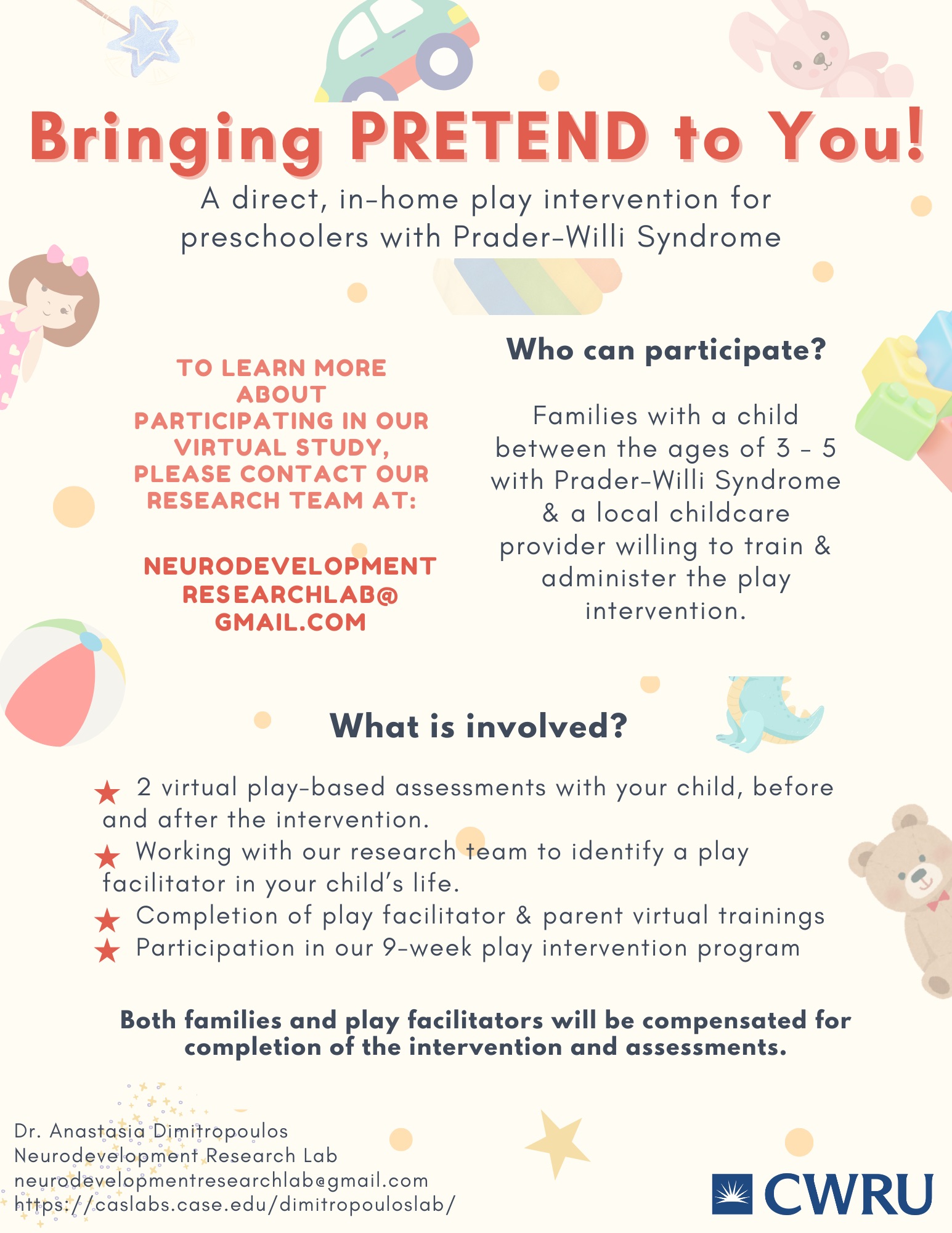
Play-Based Remote Enrichment to Enhance Development Program (PRETEND)
The Play-Based Remote Enrichment to Enhance Development Program or PRETEND, is an innovative intervention designed for children with Prader-Willi Syndrome (PWS) and their families. It was born through the collaboration of Dr. Anastasia Dimitropoulos and Dr. Sandra Russ at Case Western Reserve University.
It is known that children with PWS may face challenges when making and sustaining friendships, understanding emotions, and acting appropriately in different settings. In recent research, play-based interventions focusing on pretend or imaginative play have been shown to facilitate and improve many of the skills utilized during these activities in children with Prader-Willi Syndrome. The Neurodevelopment Research Lab at Case Western Reserve University is focused on expanding and improving play intervention for children. Using pretend play can be a fun and therapeutic method of improving social cognition and assimilating important skills into daily life.
Our most recent project is a branch of the Play-Based Remote Enrichment to Enhance Development, or PRETEND Program. PRETEND’s primary objective is to aid in the development of social-cognitive skills in children with Prader-Willi Syndrome (PWS) through remote play intervention. Additionally, we hope to increase families’ accessibility through the use of remote intervention. Bringing PRETEND to You! is our lab’s most current adaptation of the PRETEND intervention. The latest project features a pilot website, known as the PRETEND Program Resource Platform, with asynchronous training modules for both parents and play facilitators to learn the skills necessary to deliver and reinforce intervention through pretend play.
Bringing PRETEND to You! - Pilot Intervention Study

What is involved?
If eligible and willing to participate in the study, a parent will complete several self-report questionnaires about their child’s functioning and behavior, as well as participate in a virtual assessment before and after the intervention. Next, parents will work with the researchers to choose a local provider who is willing to take on the role of a play facilitator to work with the child throughout the intervention. For instance, a family might identify their favorite after-school instructor as a potential play facilitator. The instructor will first complete play facilitator training, to build a foundation of knowledge on proper play implementation.
Once the play facilitator has completed their knowledge training, they will meet with the research team to discuss any questions or concerns before beginning the intervention. Following the meeting, they may begin working on play intervention with the child, following the platform’s implementation training course. During the intervention, parents will follow their own training course to ensure that play skills are reinforced at home. The online platform will also host a resource library, including intervention strategy videos, helpful worksheets, and other relevant materials for participating families to access.
Who can participate?
You may be eligible to participate if you are a:
- Parent of a child ages 3-5 with a confirmed diagnosis of Prader-Willi Syndrome (PWS).
**Parents are also encouraged to think about a current local provider in the child’s life to implement the play intervention with their child!
If you are interested in learning more about this study or seeing if you are eligible to participate, please fill out the interest form (linked here), or contact us at neurodevelopmentresearchlab@gmail.com.
Bringing PRETEND to You! - Focus Groups
Recruitment for this portion of the study has concluded. Thank you for your participation! Please see our additional projects if you are interested in participation.
What is involved?
Before distributing the intervention to families, the Neurodevelopment Research Lab aims to meet with parents and childcare providers through virtual focus groups. The purpose of these meetings is to discuss the best approach for administering play intervention through the PRETEND Resource Platform. Our goal is to determine who is most suitable to train as a play facilitator and implement the intervention, as well as identify the msot practical delivery method. This will allow us to tailor the resource platform accordingly through the voices of real parents and caregivers.
If interested and eligible, participants will complete a brief review of our resource platform, then partake in a one-time virtual group meeting with our lab to help us refine the resource platform.
Who can participate?
You may be eligible to participate if you are a:
- Childcare provider: Therapists, teacher’s aides, caregivers/nannies, etc.
- Parent of a child age 3-9 diagnosed with Prader-Willi Syndrome
If you are interested in learning more about this study, please contact us at neurodevelopmentresearchlab@gmail.com.

Why PRETEND?
Our resource platform, like our earlier work, is designed to be completed from the comfort of your own home. All you need is internet access!
We know you’re busy. That’s why our program was built with flexibility in mind. Our program allows you to schedule the intervention on your own time.
Kids love playing, and we love it too! Imaginative play can be a great platform for working through emotions and practicing tough social skills.
